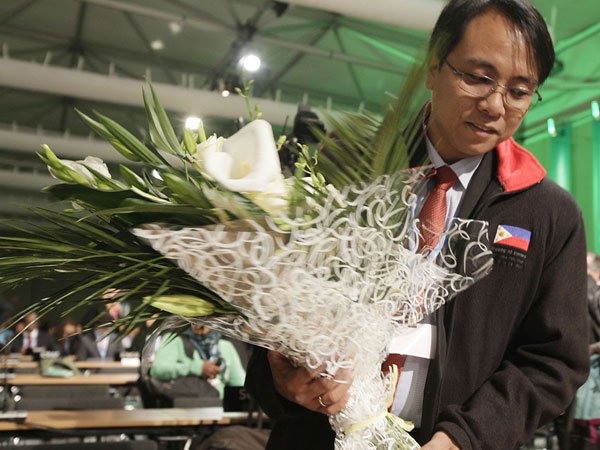UN climate talks open amid ‘sobering’ supertyphoon in Philippines

Naderev Sano from the Philippines holds flowers that where presented by other nations and organizations as a sympathy symbol for the Philippine people hit by supertyphoon “Yolanda” (“Haiyan”) during the opening of the United Nations Climate Change Conference in Warsaw, Poland, Monday, Nov. 11, 2013. Sano was given a standing ovation after he announced he would fast for the duration of the conference until it comes up with “meaningful outcome.” AP
WARSAW—Nations launched a new round of talks Monday for a 2015 deal to cut Earth-warming greenhouse gas emissions, in the aftermath of a devastating Philippine typhoon the UN’s climate chief labeled “sobering.”
Christiana Figueres urged progress at the notoriously fractious talks amid a slew of new warnings of potentially disastrous global warming as a Filipino negotiator made a tearful undertaking to fast until the talks yield a tangible result.
“What happens in this stadium (talks venue) is not a game. There are not two sides but the whole of humanity. There are no winners and losers, we all either win or lose in the future we make for ourselves,” said Figueres, head of the UN Framework Convention on Climate Change.
“The recent very painful events of cyclone Haiyan (Yolanda)… have reminded the countries gathered here… of the urgency of coming to a resolution of how all countries are going to collaborate with each other to address climate change in a timely manner.”
The meeting was taking place under the weight of many “sobering realities,” of which Yolanda in the Philippines was one, said Figueres.
The typhoon is feared to have killed 10,000 people, with Filipino delegate Naderev Sano among those anxiously waiting for news on loved ones.
“In solidarity with my countrymen who are struggling to find food back home and with my brother who has not had food for the last three days… I will now commence a voluntary fasting,” he told fellow negotiators as the 12-day talks got underway.
“I will refrain from eating food during this COP (conference of parties) until a meaningful outcome is in sight”—which could include pledges of money for a Green Climate Fund meant to disburse resources to developing countries for coping with climate change.
Standing ovation
Sano was given a standing ovation.
The UN has set a target of limiting global average warming to two degrees Celsius (3.6 degrees Fahrenheit) over pre-Industrial Revolution levels—at which scientists believe we can avoid the worst effects of climate change.
The world seeks to reach that goal by curbing emissions of invisible, heat-trapping gases from burning fossil fuels which provide the backbone of the world’s energy supply today.
Reducing this pollution requires a costly shift to cleaner, more efficient energy, which partly explains why the UN negotiations have been such a battlefield.
Last week, the UN Environment Program (UNEP) said the chances of meeting the two-degree goal were “swiftly diminishing”, while the World Meteorological Organisation reported that atmospheric levels of greenhouse gases hit a new record high in 2012.
In September, the UN’s Intergovernmental Panel on Climate Change (IPCC) predicted global surface temperatures could climb on average by as much as 4.8 C (8.6 F) this century—a recipe for catastrophic heatwaves, floods, droughts and sea-level rise.
“We are clearly trending towards a substantial increase in the temperature of the surface across the globe,” IPCC chairman Rajendra Pachauri told the Warsaw negotiators Monday.
The UNEP has said that in order to contain warming to two degrees C, greenhouse gas emissions must drop to 44 gigatonnes of CO2 equivalent by 2020 and then halve by 2020.
“We must get to global peaking of emissions this decade and to zero net emissions by the second half of this century,” said Figueres.
Though the stakes are high, no specific targets have been set for this round of the annual talks, hosted by one of the world’s biggest coal polluters just two years before the tortuous global process must deliver a global deal.
Observers hope negotiators will do some legwork for the much-trumpeted agreement, due to be signed in Paris in 2015 for implementation five years later.
The Warsaw talks are scheduled to wrap up on November 22, at ministerial level.
The gloves are expected to come off over help for poorer nations to cope with climate change.
Rich economies have yet to show how they intend to meet a pledge, made back in 2009, to muster $100 billion per year from 2020.
“The tragic aftermath of Supertyphoon Haiyan… serves as a stark reminder of the cost of inaction on climate change and should serve to motivate our work in Warsaw,” said the Alliance of Small Island States (Aosis)—a grouping of countries at high risk of climate change-induced sea level rise.
“Science has confirmed that unless we begin to reduce emissions immediately, the opportunity to keep global warming below the critical 1.5 degree threshold could be irrevocably lost.”—Mary Sibierski














